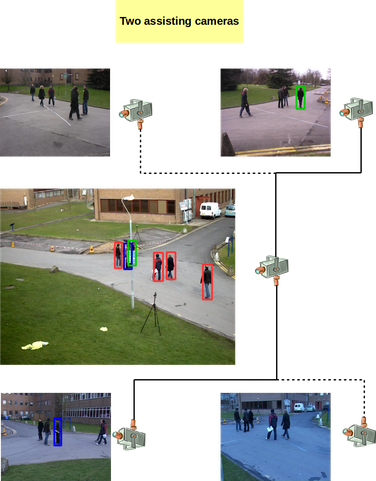Marie Skłodowska-Curie Action ITN ACHIEVE
"ACHIEVE - “Advanced Hardware/Software Components for Integrated/Embedded Vision Systems”
ACHIEVE - “Advanced Hardware/Software Components for Integrated/Embedded Vision Systems” is an Innovative Training Network of the Marie Skłodowska-Curie Actions (H2020-MSCA-ITN-2017) which trains a new generation of nine young researchers through international, interdisciplinary mobility. The topic of ACHIEVE’s research program is hardware/software co-design for ultra-efficient embedded vision systems that will form the basis for innovative distributed vision applications. The consortium is composed of 6 academic and 1 industrial beneficiaries and 4 industrial partners. The project is coordinated by Ricardo Carmona Galán, PhD (Agencia Estatal Consejo Superior de Investigaciones Científicas (CSIC) / Instituto de Microelectrónica de Sevilla, Spain) and runs from October 2017 until September 2021.
The project

To address these challenges, ACHIEVE ESRs will develop core skills in multiple disciplines, from image sensor design to distributed vision algorithms, and at the same time they will share the multidisciplinary background that is necessary to understand complex problems in information-intensive vision-enabled applications. Concurrently, they will develop a set of transferable skills to promote their ability to cast their research results into new products and services, as well as to boost their career perspectives overall.
Altogether, ACHIEVE will prepare nine highly skilled early-stage researchers able to create innovative solutions for emerging technology markets in Europe and worldwide but also to drive new businesses through engaging in related entrepreneurial activities. The training will be achieved by the proper combination of excellent research, secondments with industry, specific courses on core and transferable skills, and academic-industrial workshops and networking events.
Objectives
• To develop integrated sensing and processing chips that combine image capture with on-chip acceleration feature extraction/learning with a limited number of resources and under a restricted power budget.
• To design a chip architecture that extracts 2D and 3D information at sensor level for an enriched description of the scene that can be shared and combined between groups of camera nodes working in cooperation.
• To design hardware accelerators that will permit the implementation of heavy-duty feature and representation learning and deep learning inference.
• To design compact and efficient reconfigurable embedded vision systems, where local processing of visual information is combined with agile transmission of metadata and a careful power management.
• To develop the cooperative vision algorithms that will operate on an enriched representation of the scene that can be locally shared by a set of nodes, allowing them to react collectively.
• To discard the concept of a central hub where all the data crunching is performed in favour of a scalable distributed processing system in which visual information drives dynamic adaptation and feedback to enhance users’ experience.
• To introduce scalable, easily deployable, always-on, visual monitoring methods that will be the basis for a new class of products and services.
Role of Ghent University
The professors of Ghent University will supervise two ESRs in the field of cooperative multi-camera computer vision, specifically on cooperative tracking, visual analytics and scene modelling. Another important contribution will be in optimized algorithmic implementations using the Quasar/Redshift environment.
Contact
Prof. Wilfried Philips, Dr. Ljiljana Platisa
Department of Telecommunications and Information Processing
Image Processing and Interpretation
Phone number: +32 9 264 3385
E-mail: Wilfried.Philips@UGent.be, Ljiljana.Platisa@UGent.be